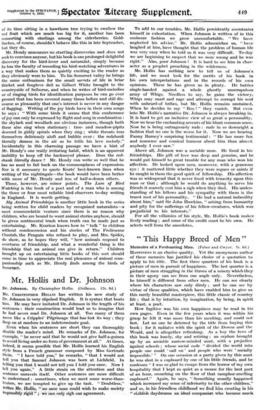Mr. Hollis and Dr. Johnson
Dr. Johnson. By Christopher Hollis. (Gollanez. 12s. 6d.) Mn. . CHRISTOPHER. HOLLIS has written his new study of Dr. Johnson- in very slipihod English. It is syntax that beats him. He may have imitated Dr. Johnson in the length of his sentences : their construction would lead us to imagine that he had never read Dr. Johnson at all. Too many of them move like a Cripples' Pilgrimage that has lost its way : they limp on at random to an indeterminate goal.
Even when his 'sentences are short they can thoroughly disable the reader's mind. He remarks of Dr. Johnson, for example, " he never said that he would not give half-a-guinea to avoid living under no form of government at all." At times, indeed, it seems possible that Mr. Hollis learned his English style from a French grammar composed by Miss Gertrude Stein. " I have told you," he remarks, " that I would not tell you that Samuel Johnson was born at Lichfield. In telling you that I- would not tell you I told you once. Now I tell you again." A little strain on the attention and this sentence unravels itself. Other sentences are more difficult to understand ; sometimes, when we meet some worse-than- truism, we are tempted to_ give up the task. " Doubtless," Writes Mr. Hollis, " no sane man could wish to make society impossibly rigid" ; we can only sigh our agreement.
To add to our troubles, Mr. Hollis persistently overstrains himself in exhortation. When Johnson is written of in this ominous fashion we grow uncomfortable. " We have neglected his advice," Mr. Hollis admonishes us, " have laughed at him, have thought that the problem of human life was very easy when he told us it was very difficult. To-day we are beginning to suspect that we were wrong and he was right." Alas, poor Johnson ! It is hard to see him in char- acter as a prophet preaching in the wilderness. .
Mr. Hollis has nothing new to tell us of Johnson's life, and we must look for the merits of his book in his own interpretations and in the records of his own opinions. These he has given us in plenty. He battles single-handed against a whole ghostly unscrupulous army of Whigs. Needless to say, he gains the victory.
Whigs may snarl and rage and attempt to corrupt his soul with unheard-of bribes, but Mr. Hollis remains unstained.
When he decides to say " Boo ! " they vanish. But even into Mr. Hollis's narrative Dr. Johnson is always breaking in. It is hard to get an inclusive view of so great a personality.
Now we hear the enchanting accents of his blunt common sense. Now he is being outrageously rude : rude in so downright a fashion that no one is the worse for it. Now we are hearing Fanny Burney's surprising testimonial : " He has more fun and nonsense and comical humour about him than almost anybody I ever saw."
Above all, Johnson was a sociable man. He lived in his. friendships. His gift of love was deep and genuine, and he
would put himself to great trouble for any man who won his affection. He looked upon men, moreover, with a generous eye : it mattered little whether they were rogues or saints if he caught in them the good spirit of fellowship. His affection was so widespread that it never fixed with tenacity upon this man or that ; although he would do anything to serve his friends it scarcely cost him a sigh when they died. His under- standing of his fellows and his sympathy with them is the truest root of his personality. " He had a natural imbecility about him," said Sir John Hawkins, " arising from humanity and pity for the sufferings of his fellow-creatures, which was prejudicial to his interests."
For all the villainies of his style, Mr. Hollis's book makes lively reading ; and some of the credit must be his own. He, selects well from the anecdotes.






















































 Previous page
Previous page